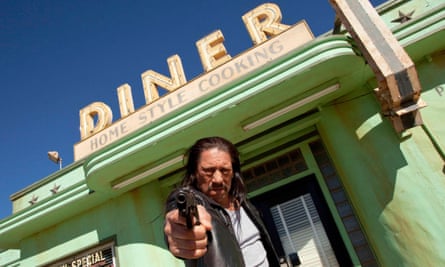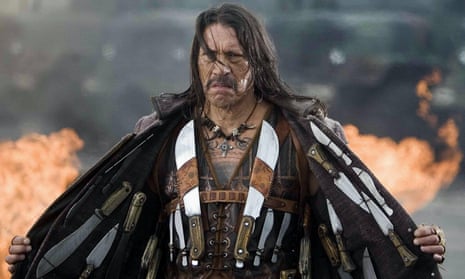Danny Trejo is 74 but he was never meant to live so long. “I didn’t even think I’d make it out of the 1960s,” says the actor, with a deep husky laugh. “I picked the wrong role model,” he explains, recalling how he first tried heroin at the age of 12 and embarked on a life of crime. “I picked my uncle, who was a drug addict and an armed robber. But he was the greatest guy in the world as far as I was concerned.”
Trejo ended up serving time in every state prison in California. But something happened in 1968 that would change his life. The actor, who has starred in everything from Machete to Spy Kids, was involved in a prison riot and got caught throwing a rock at a guard. “I went to the hole,” he says. “Me and two other inmates thought we were going to the gas chamber. I was potentially facing the death penalty.”
Trejo came up with a remarkable plan. “I made a deal with God. I said, ‘Let me die with dignity. If you do, I’ll say your name every day and I’ll do whatever I can for my fellow man.’ I didn’t want to go to the gas chamber, screaming and yelling and peeing myself.”

We’re sitting in a Manchester bar, the evening before Trejo is due to appear at For the Love of Horror, a two-day film convention. Nearby sits Tyler Mane, who plays Michael Myers in the latest Halloween films, although the masked murderer looks slightly less terrifying when eating a salmon and cucumber sandwich.
Trejo wasn’t charged for inciting the riot and was later released. He kept his word, went clean, prayed to God each day and began work as a drug counsellor. In 1985, he was brought on to the set of Runaway Train to help with the shoot’s drug problems. The screenwriter, himself an ex-convict called Edward Bunker, recognised Trejo from San Quentin prison and, knowing his reputation as a fighter, asked for help with a boxing scene. And so began Trejo’s entry into the film world, a world awash with drugs, he recalls. “You could walk into a production company and there would be big lines of coke on the desk,” he says. “The stuntman would be on coke. Everybody was on it.”
Trejo started to get bit parts, his tough guy appearance and grizzly voice steering him in a certain direction. “The first five years of my career, I played Inmate Number One.” He laughs and his mouth curls to one side, taking with it his trademark neatly trimmed moustache. “People say, ‘You always play the mean Chicano dude with tattoos.’ Well, I am the mean Chicano dude with tattoos.” He lifts up his shirt in the middle of the bar to show me his chest, which is emblazoned with a tattoo of a woman wearing a sombrero. “So they got it right. They’re not going to cast Marky Wahlberg as the mean Mexican guy.”
Trejo – who is the subject of a forthcoming documentary that’s actually called Inmate Number One – says his acting career began long before he first set foot in front of a camera. “Prison was where my training came in: being on a prison yard, knowing there’s going to be a riot, and having to stand there and act tough, when really you have doo-doo in your pants. There are two kinds of people in prison: predator or prey. Every morning, you have to pick which one you’re going to be.”
Trejo may now be clean but there is still one addiction in his life. “I love working,” he says, though this is partly because he has concluded that crime really doesn’t pay. “I realised that if I rob someone for $800, that may only take two minutes – but the other price is probably five years in prison. If you divide $800 into five years, it’s not a very good hourly wage.”
While he can boast appearances in Breaking Bad and The X-Files, Trejo knows there is a definite flavour to his screen career, which includes such titles as Cage, Guns, Maniac Cop 2, Marked for Death, Carnal Crimes, Blood In Blood Out and LA Slasher. As for Three-Headed Shark Attack, he knows it is no Heat – but he is unapologetic.

“When people say, ‘I didn’t like that movie, it’s a bad movie’, I say, ‘There’s no such thing.’ That movie you’re talking about helped support 80 families. It got some kid a bike for Christmas. I may not like the content of some films, but I can appreciate that, by it being made, it might have put someone’s kid through college.”
Trejo has even entered the restaurant business. Today he is wearing his company’s merchandise from head to toe: his face stares out at me from the logo on his Trejo’s Tacos baseball cap and shirt. The move has inspired a sitcom called Food & Familia. Loosely based on the actor’s life, it is currently in development at ABC and will star Trejo in a headline role.
While he has come a long way, Trejo never cut ties with his uncle Gilbert. “Every time he got out of prison, I would try to help him. I never gave up on him.” Gilbert eventually died of a drug overdose and Trejo named his son after him. “He was institutionalised and once you become institutionalised, it’s so hard to come back. I was pretty well institutionalised. But by the grace of God, I’m still here.”

Comments (…)
Sign in or create your Guardian account to join the discussion